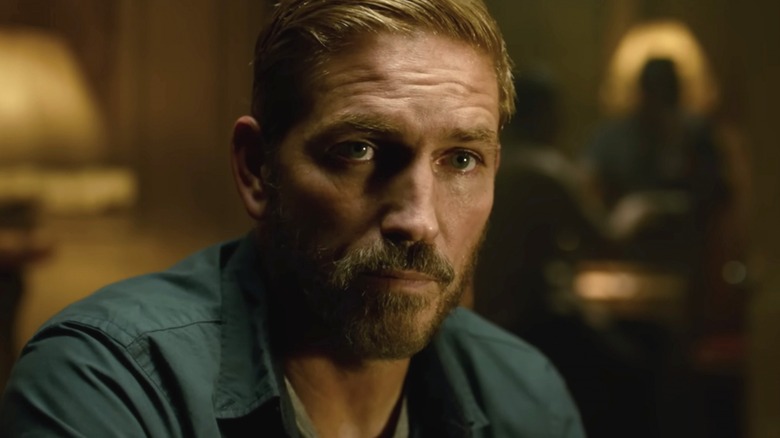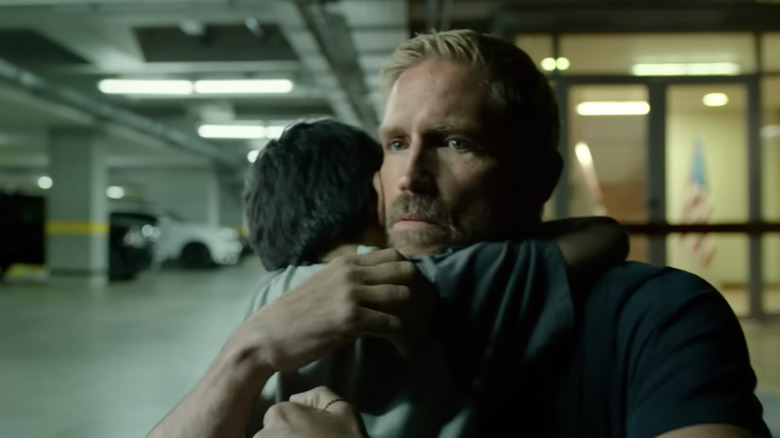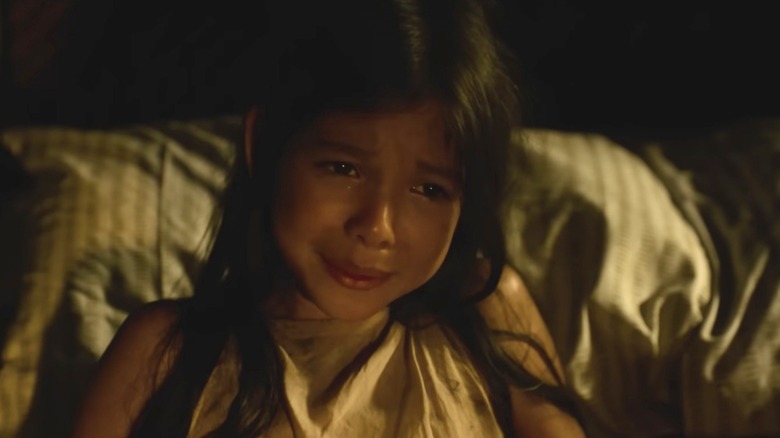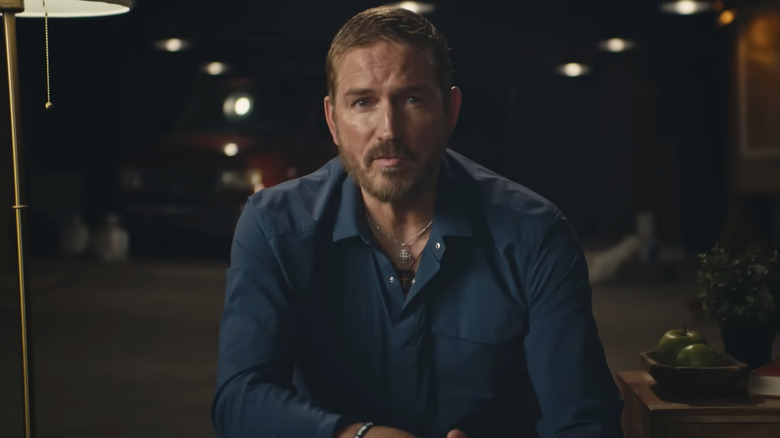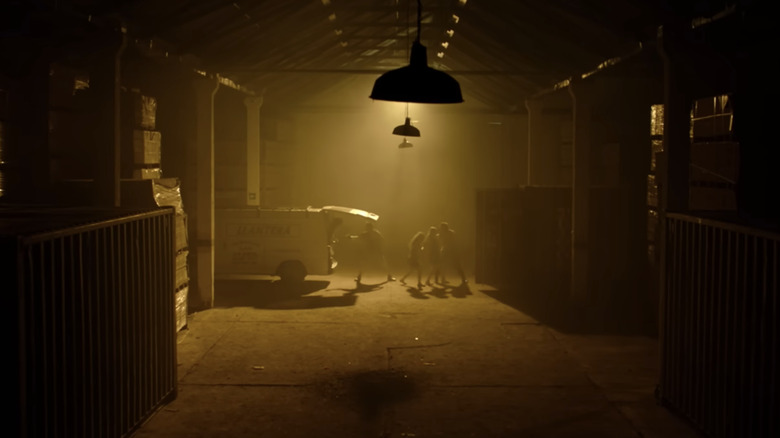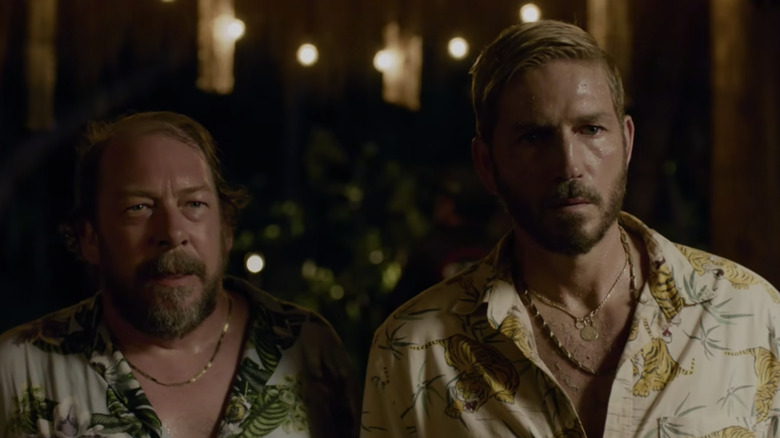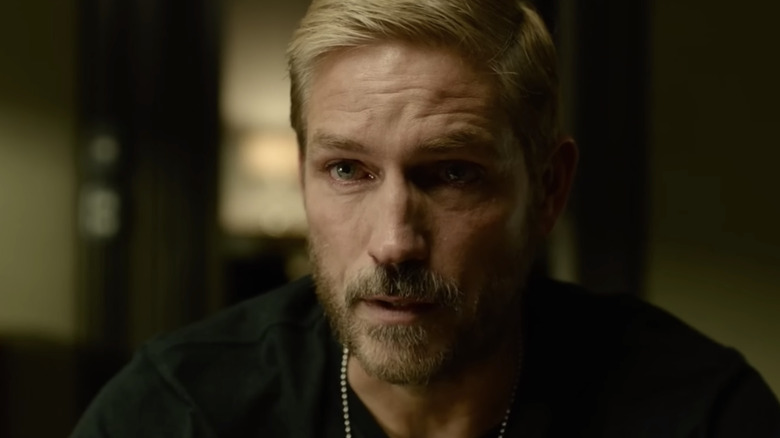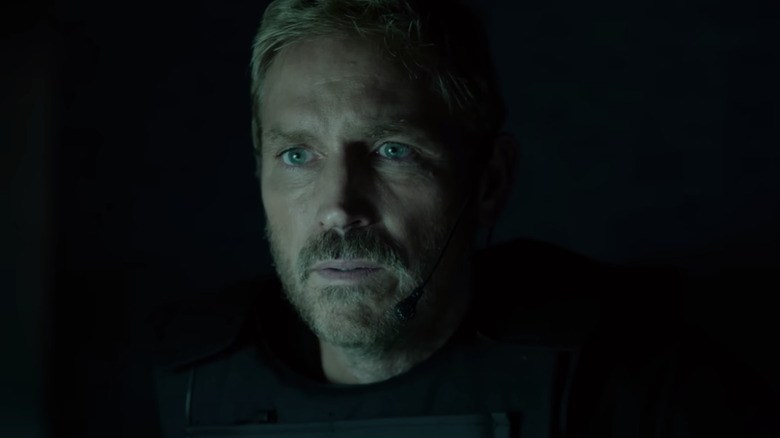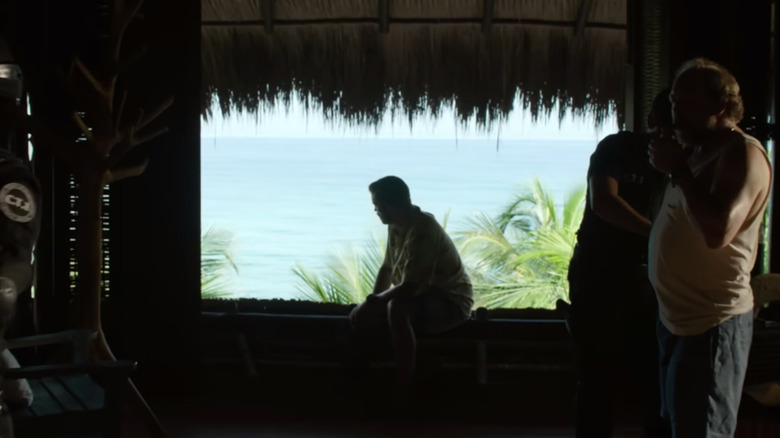The Ending Of Sound Of Freedom Explained
From sleeper hit to box office success, "Sound of Freedom" has grown significantly in popularity since its release on July 4, 2023. Distributed by independent media company Angel Studios — best known for their multi-season series "The Chosen," a television adaptation of the story of Christ — "Sound of Freedom" has made over $85 million domestically despite playing in only 2,626 theaters initially. Additionally, the film beat "Indiana Jones and the Dial of Destiny" domestically on America's Independence Day and has stuck around the top five domestic players in the three weekends after its release. In its second week, "Sound of Freedom" saw a drastic 37% increase in box office revenue, playing in over 3,000 theaters and placing just behind "Mission: Impossible — Dead Reckoning Part One."
Though the film has received mixed-to-positive reviews from critics, "Sound of Freedom" has been highly successful with audiences, with a 100% audience score on Rotten Tomatoes (compared to the 73% fresh critical rating), an A+ Cinemascore, and an 8.2 on IMDb. No doubt, audiences are loving the Jim Caviezel human trafficking thriller, and though it's not "Taken," it's an exciting feature that highlights a global crisis.
Caviezel's work as former Homeland Security Investigations (HSI) agent Tim Ballard is one of his most compelling roles. As Ballard fights to reunite two trafficked and separated siblings, he pushes himself to his absolute limits and risks his life in ways he never would've imagined. Though the story has a relatively happy ending, there are some things you may have missed.
What you need to remember about the plot of Sound of Freedom?
"Sound of Freedom" begins with the abduction of Rocío (Cristal Aparicio) and Miguel (Lucás Ávila), two young Honduran siblings who are tricked by human traffickers posing as a child modeling agency. Unable to find his children, their father, Roberto (José Zúñiga), loses all hope. Meanwhile, in the United States, HSI agent Tim Ballard (Caviezel) takes down pedophile Ernst Ohinsky (Kris Avedisian) and uses him to catch trafficker Earl Buchanan (Gary Basaraba), who just so happens to be transporting Miguel for a sexual encounter.
In befriending Miguel, Ballard learns that his sister is also missing and that they've been separated for a long time. After reuniting Miguel with his father, Ballard swears that he'll find Rocío, no matter how long it takes. This leads him to Colombia, where he starts working with local law enforcement officer Jorge (Javier Godino) and Vampiro (Bill Camp), a former cartel accountant-turned-child liberator. With their help, Ballard sets up a sting to catch those responsible for kidnapping Miguel and Rocío, namely Gisselle (Yessica Borroto).
Unfortunately, Ballard is forced to quit his job while doing so, choosing to fight for Rocío when no one else would. While the sting itself is successful (they rescued 54 children), Rocío is not among those saved. Eventually, Ballard learns that she was sold to a Revolutionary Armed Forces leader named El Alacrán (Gerardo Taracena) aka "the Scorpion."
If you or someone you know may be the victim of child abuse, please contact the Childhelp National Child Abuse Hotline at 1-800-4-A-Child (1-800-422-4453) or contact their live chat services.
What happened at the end of Sound of Freedom?
In order to take on El Alacrán and save Rocío, Ballard and Vampiro are forced to go undercover as doctors with U.N. vaccines so that they can infiltrate the rebel's base in the jungle. Unfortunately, they must do this without any official support from the Colombian government, making it unlikely that they'll return. Upon reaching the river, Ballard is taken by the armed forces and Vampiro is left with Jorge. Fortunately, Ballard is able to convince El Alacrán that he is in fact a doctor and that he must help those who may be sick.
Using his cover, Ballard eventually finds Rocío, who is being used as El Alacrán's personal sex slave. As evening falls, Ballard infiltrates El Alacrán's quarters and finds Rocío, convincing her that he's there to help her. However, when a drunken El Alacrán arrives, the former HSI agent is forced to kill the warlord before he and the young girl escape on foot. After dodging the armed forces and plenty of gunfire, Ballard and Rocío escape with the help of Jorge and Vampiro.
By the film's end, Rocío is reunited with her brother and father. After months apart from his own family, Ballard has completed his mission and finally returns home to hold his wife and children. As the movie comes to a close, Rocío sings alone in her room, thankful to be back home.
If you or someone you know may be the victim of child abuse, please contact the Childhelp National Child Abuse Hotline at 1-800-4-A-Child (1-800-422-4453) or contact their live chat services.
Unpacking the epilogue and final message
After the movie, "Sound of Freedom" features an epilogue that shows footage of the actual Tim Ballard and his testimony before the United States Congress, explaining how he helped pass laws requiring the U.S. government to cooperate with foreign nations during sex trafficking investigations. Additionally, the movie ends by stating, "Human trafficking is a $150 billion a year industry. The US is one of the top destinations for human trafficking and is one of the top consumers for child sex. There are more humans trapped today in slavery than at any point in human history, including when slavery was legal. Millions of these slaves are children."
Admittedly, actual figures concerning human trafficking are hard to come by, but these statements nevertheless ring true. In 2019, The Guardian reported that over 40 million people live in modern-day slavery, based on data from the United Nation's International Labour Organization and the Walk Free Foundation. While not all of that is sex slavery specifically, it is certainly a component of human trafficking. Additionally, UNICEF reports that "[the United States is] considered one of the top destination points for victims of child trafficking and exploitation."
As the film's credits roll, actor Jim Caviezel takes the stage to encourage audiences to share the movie with others, saying he hopes that this story — like "Uncle Tom's Cabin" did with legal slavery prior to the American Civil War — might spark a resolve to help end human trafficking once and for all.
Why Tim Ballard had to quit his job
There's no question that the character of Tim Ballard in "Sound of Freedom" did the right thing when searching for and rescuing young Rocío. No one else was coming, and if he didn't do it, then no one would have. But why did he have to quit his job in order to pursue her rescue? Couldn't he have just asked for time off? In the film, Ballard and his superior, Frost (Kurt Fuller), work alongside the Colombian government to organize the raid that will bring Gisselle and the other traffickers down. But given Ballard's over-budget mission wasn't sanctioned by the US government, Frost was forced to bring him home.
Rather than accept defeat, Ballard quit his job — with his wife Katherine's (Mira Sorvino) blessing — to return to Colombia and see the sting operation through. Had he not quit, he would've been forced to return to his usual HSI duties, ultimately limiting how many children he could save. With his newfound freedom, Ballard was able to work alongside the Colombian authorities to organize the raid, which eventually led to Frost convincing the U.S. embassy in Colombia to offer their support as well.
It was certainly a risky move for Ballard to quit his consistent job for this mission, especially with a half-dozen children at home to care for, but Rocío's life and freedom were worth more to the former HSI agent than his paycheck.
How long were Miguel and Rocío missing?
The exact timeline of "Sound of Freedom" is a bit messy since, for the most part, the mention of months, dates, and years is largely excluded. However, the very beginning of the film shows the abduction of Miguel and Rocío, which occurs in their hometown of Tegucigalpa, Honduras. From there, the children are shipped by freight to Cartagena, Colombia. While a direct flight from Tegucigalpa to Cartagena is about 11 hours, traveling by freighter would take considerably longer. More than likely, Miguel and Rocío were on the boat for at least a week.
Additionally, by the time Tim Ballard and his HSI team rescue Miguel, they believe that he'd been held captive in Tijuana, Mexico (after being separated from Rocío in Colombia) for some time, possibly up to three months. From there, Ballard works overtime to find Rocío, and after the sting operation – which in real life took months to plan and execute – they still hadn't found her.
Possibly months later, Ballard finds Rocío in the Amazon jungle before getting her back home to her family. How much longer after the sting this took place, we're unsure, but it's obvious that she's been gone for a while. Considering all of this, "Sound of Freedom" implies that Rocío had been missing for possibly over six months, while her brother, Miguel, was gone for about half of that time.
What's the significance behind the Timoteo necklace?
Before being separated, Rocío passes her necklace on to Miguel. This gesture gives Miguel strength during the abuse he endures and allows him to remain close to his sister despite their distance. But upon being rescued by Tim, Miguel gives the HSI agent his sister's necklace, passing it onto him so that he will remember that she is out there and do something about it.
Embedded on the necklace is a depiction of the Chapel of Timothy ("Timoteo" in Spanish), a New Testament saint mentored by the Apostle Paul, followed by a possible reference to 1 Timothy 6:11. Naturally, Miguel saw Ballard's own name as a sign that he was the one God sent to rescue them, and thus, with the pendant, commissioned Ballard to save his sister. Upon rescuing Rocío, Ballard returns the necklace, symbolizing that she too is now protected from such evil.
In real life, Tim Ballard had a similar experience, he said, when a young boy gave him the necklace after his rescue. "To me, call it luck, chance, coincidence, God, whatever you want to call it, it was a message," Ballard is quoted as saying by his nonprofit Operation Underground Railroad (OUR). "That necklace symbolized a calling now to me. ... This is what I'm called to do, this is what I'll do for the rest of my life."
What is the titular Sound of Freedom?
While "Sound of Freedom" is certainly an apt title for an anti-human trafficking drama meant to raise awareness, there's actually a deeper meaning to the words. The phrase "sound of freedom" is only heard once in the 2023 thriller, but it's uttered in a powerful moment that comes back by the film's end. The first half of the movie builds up to the sting operation in Colombia, meant to rescue Rocío and a number of other children. Though Rocío isn't found, over 50 are saved by Tim and his team's efforts.
Following the successful sting operation, Ballard and Vampiro watch as dozens of rescued children sit freed, being cared for by the authorities and counselors brought in to help them adjust after such a horrific endeavor. At some point, the children begin to sing, a sound that Vampiro calls the "sound of freedom." That's right, the sound of freedom is the newly restored voice of those who have been taken and subjected to terrible things as a result of human trafficking. But this isn't the only time the sound is heard.
After Ballard eventually rescues Rocío, and upon returning home, she too sings a ballad of freedom. But this time it's different. Instead of singing alone as she does at the beginning of the film, other voices can be heard in the background, singing along with her and reminding audiences that children are not for sale.
If you or someone you know may be the victim of child abuse, please contact the Childhelp National Child Abuse Hotline at 1-800-4-A-Child (1-800-422-4453) or contact their live chat services.
Is Sound of Freedom a faith-based movie?
Given Angel Studios' ties to the television series "The Chosen" as well as their first theatrical release, "His Only Son," which retold the story of the biblical patriarch Abraham, many have wondered if "Sound of Freedom" too is a faith-based production. Well, the real Tim Ballard is a professing Mormon, and actor Jim Caviezel and director Alejandro Monteverde are Catholic, but the movie itself isn't a religious drama (there's actually some minor language here). Aside from quoting Luke 17:2 and the epic tagline, "God's children are not for sale," the movie doesn't venture any further into Ballard's faith.
Angel Studios' second theatrical release, "Sound of Freedom" proves that independent features can thrive at the box office through grassroots and word-of-mouth marketing strategies. No doubt, the faith-based audience has been invaluable in making that happen (not unlike how "The Chosen" became the largest crowdfunded media project of all time) and has certainly impacted "Sound of Freedom's" box office success.
Despite that, "Sound of Freedom" is not a faith-based drama. Like action movies such as "The Book of Eli" or "Man of Steel," there may be allusions to Christianity and other faiths, but "Sound of Freedom" is strictly an anti-human trafficking thriller meant to raise awareness through entertainment. Any further ties or connections to the faith-based market are coincidental, especially given the movie was originally set to be released by a Fox subsidiary before the studio was bought by the Walt Disney Company.
Is there a connection to QAnon?
Since the film's release, many media outlets have claimed that "Sound of Freedom" is a "QAnon-adjacent" thriller with considerable ties to the conspiracy theory, but does that hold any merit? For starters, the film itself never mentions any conspiracy theories, let alone QAnon. (The thriller was completed back in 2018, shortly after QAnon adherents were gaining recognition in news outlets). Additionally, the movie itself is based on a true story — though it does take liberties — and doesn't dabble in the conspiracy theory space even a smidge. Instead, it works hard to highlight the very real horrors of human trafficking and raise awareness for the issue. So where does this QAnon association come from?
Ballard himself has promoted QAnon theories. So too has the film's lead, Jim Caviezel, best for his work as Jesus Christ in Mel Gibson's "The Passion of the Christ" and as John Reese on the CBS series "Person of Interest." Since 2021, Caviezel has expressed his belief in QAnon conspiracy theories centering around "adrenochrome," a chemical compound in the human body that QAnon believers assert is harvested from trafficked children by wealthy elites for its supposed de-aging properties. There is no evidence to support this.
Neither Ballard's nor Caviezel's personal politics play a role in the film at all, though the subject matter of "Sound of Freedom" — child trafficking — is a main talking point of QAnon believers. No QAnon beliefs, including adrenochrome harvesting, are mentioned in the film. Instead, the link is primarily due to the beliefs of Ballard and Caviezel as well as how the QAnon community has embraced and promoted the film.
How much of Sound of Freedom is a true story?
"Sound of Freedom" is loosely based on a true story but doesn't strictly follow the facts. Like many Hollywood "true story" movies, in an effort to tell a compelling tale while raising awareness on an important issue, co-writer and director Alejandro Monteverde adjusted Tim Ballard's real-life adventures for the big screen — with the actual Tim Ballard's permission, of course. "Operation Triple Take," the raid in Colombia that rescued over 50 children, really happened, led by U.S. Immigration and Customs Enforcement, HSI, and the Colombian attorney general's special criminal investigative unit in collaboration with the Colombian Navy and Coast Guard and nonprofits Breaking Chains and Ballard's OUR.
OUR confirms that Vampiro is based on a real ally of Ballard's, and though he wasn't involved in Operation Triple Take, he did lead another mission in Colombia the same day. Miguel and Rocío are likewise based on real victims of human trafficking, though the real child whom Tim Ballard dropped everything (including his job) to search for, a young boy named Gardy, has yet to be found.
The organization also said Ballard never went into the Amazon on his own to rescue a child, nor did he kill anyone. And while the real Ballard did go undercover as a doctor, it never resulted in a child being rescued. OUR also explains that the film erroneously depicts child sex trafficking as predominantly fueled by kidnappings, while in real life many children who end up in sex trafficking are groomed by adults. The film's depiction of Tim's arrest of Earl Buchanan is also subject to controversy as to its accuracy. While "Sound of Freedom" does take a strong stance against a heinous real-world issue, many of its most exciting sequences are the stuff of Hollywood spectacle.
If you or someone you know may be the victim of child abuse, please contact the Childhelp National Child Abuse Hotline at 1-800-4-A-Child (1-800-422-4453) or contact their live chat services.
